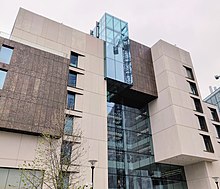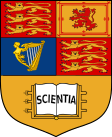Department of Chemistry, Imperial College London
 Molecular Sciences Research Hub, White City | |
Former name | Royal College of Chemistry |
|---|---|
| Established | 1845 |
Head of Department | Professor Oscar Ces[1] |
| Faculty | Imperial College Faculty of Natural Sciences |
| Staff | 46[2] |
| Students | 861[2] |
| Location | Imperial College Road, London, United Kingdom 51°29′52″N 0°10′39″W / 51.497708°N 0.177475°WCoordinates: 51°29′52″N 0°10′39″W / 51.497708°N 0.177475°W |
| Campus | South Kensington White City (research) |
| Website | www |
| Map | |
 Location in Albertopolis, South Kensington | |
The Department of Chemistry is responsible for chemistry teaching and research at Imperial College London. The department has around 50 academic staff and 850 students, with around 550 studying undergraduate courses and 300 research students.[3] The department is based in Chemistry Building along Imperial College Road, looking over Queen's Lawn, but also uses the remaining section of the Royal College of Science building. The department has relocated some of its research to new facilities at the 154.4 million pound[4] Molecular Sciences Research Hub at Imperial's new White City campus. The department ranks 9th in the QS 2018 subject world rankings.[5]

History[]
The origins of the department lie in the Royal College of Chemistry, which was founded in 1845 on Hanover Square, moving the next year to Oxford Street.[6] Its first professor was August Wilhelm von Hofmann, from the University of Giessen. The college was later incorporated into the Normal School of Science as a department, and the school was refounded as the Royal College of Science in 1890.[7][8] In 1907, the Royal College of Science became one of the founding institutions of Imperial College, which joined the University of London, only to leave it and become independent in 2007.
In 2018 the Molecular Sciences Research Hub opened at the college's new White City campus, becoming the new centre for the department's academic research. Teaching will continue at South Kensington, however, students undertake research projects at the new research hub.[9]
Academics[]
Study[]
Undergraduate[]
The department offers three year BSc and four year undergraduate MSci courses.[10] The department has connections with universities in Europe, allowing undergraduate master's students to study-abroad during their course. It also allows students to take a year in industry, and incorporate management or foreign languages into the course. All students graduating with an undergraduate degree from the department are also awarded the Associateship of the Royal College of Science, ARCS.
Postgraduate[]
The department offers MRes courses in subject specialties[11] as well as taking on doctors students. It offers however no taught postgraduate programmes.
Rankings[]
The college ranks 9th on the Times Higher Education natural sciences subjects rankings,[12] and the department in particular ranks 9th in the world, and 3rd in the UK after Cambridge and Oxford, on the QS World University Rankings.[5] Domestically, the department ranks 4th in the Complete University Guide's 2019 chemistry rankings.[13]

People[]
- August Wilhelm von Hofmann, first professor at the Royal College of Chemistry
- Martha Whiteley OBE, one of the inventors of mustard gas (also an alumna of the department)
- Sue Gibson OBE
- Anthony Gerard Martin Barrett FRS, FMedSci (also an alumnus of the department, BSc PhD)
- Lord George Porter OM PRS, 1967 Nobel Prize in Chemistry[14]
Alumni[]
- Frances Micklethwait MBE ARCS, first researcher into a cure for mustard gas
- Sir Derek Barton BSc ARCS PhD, 1969 Nobel Prize in Chemistry[15]
- Sir Geoffrey Wilkinson BSc ARCS PhD, 1973 Nobel Prize in Chemistry[16]
References[]
- ^ "Contacts | Faculty of Natural Sciences".
- ^ Jump up to: a b "STATISTICS POCKET GUIDE 2016–17" (PDF).
- ^ "Imperial College - Statistics Pocket Guide" (PDF).
- ^ "Imperial's property holdings revealed". Felix. 2 March 2018.
- ^ Jump up to: a b "Chemistry | Top Universities". QS World University Rankings.
- ^ "Royal College of Chemistry". London Remembers.
- ^ "Imperial College". British History Online.
- ^ "Chemistry at Imperial | Faculty of Natural Sciences".
- ^ "Our Future | Faculty of Natural Sciences". Imperial College London.
- ^ "Course Structure and Content | Faculty of Natural Sciences". Imperial College London.
- ^ "MRes Courses | Faculty of Natural Sciences".
- ^ "World University Rankings 2018 by subject: physical sciences".
- ^ "Chemistry - University Subject Tables 2019".
- ^ "Nobel Prizes | Faculty of Natural Sciences". Imperial College London.
- ^ "Derek Barton - Biographical". NobelPrize.org.
- ^ "Geoffrey Wilkinson - Biographical". NobelPrize.org.
- 1845 establishments in England
- Educational institutions established in 1845
- Departments of Imperial College London
- Imperial College Faculty of Natural Sciences

